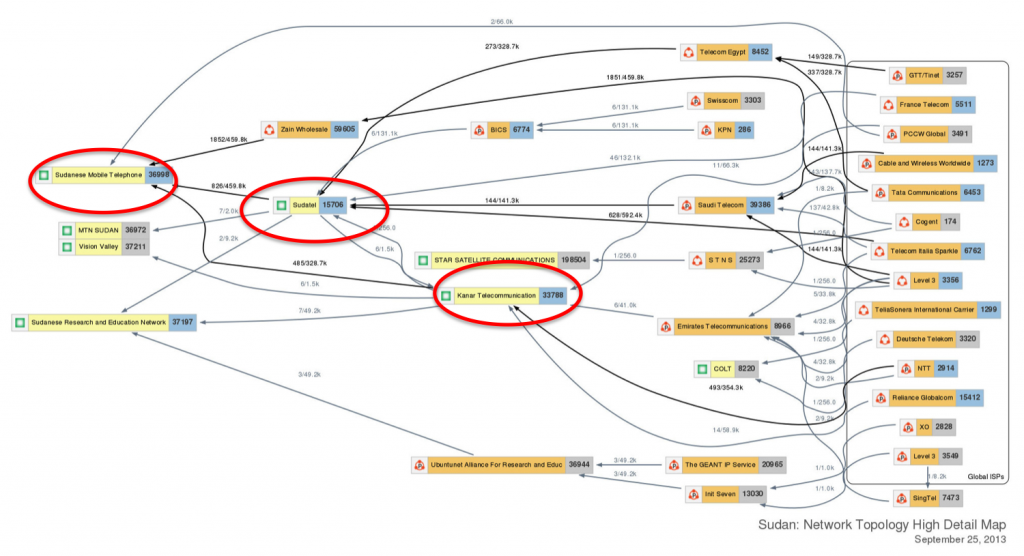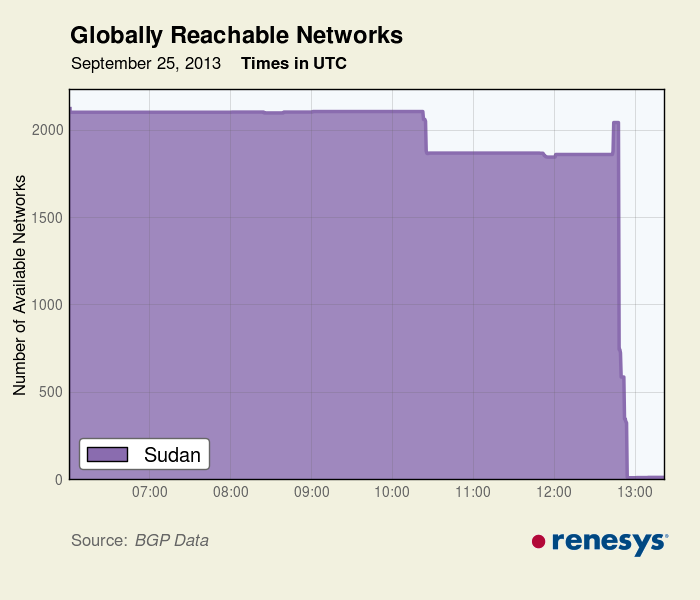Understanding Sudan’s internet outage
Update: Internet in Sudan was completely restoredat 9:52UTC on September 26th after almost a full day of total Internet blackout. The National Telecommunication Corporation (NTC) has attributed the cutting of the internet services in the country to the attack of the demonstrations on Canar Communications Company and the sabotage and looting acts committed by the rioters on the company’s equipment and installations during Wednesday’s riot incidents. He affirmed the NTC’s condemnation to such act which harms the potentialities and capabilities of the Sudanese people and their right to enjoy the internet services.
However, there is still no definitive word on why Sudan’s internet was shut-down on Wednesday, September 25th amid protests after the government lifted fuel subsidies. All signs still point to a Sudanese government afraid of citizens exposing the truth about a violent crackdown on freedom.
A variety of sources have provided visuals of the network outage affecting all of Sudan. Most prominent is the analysis from Renesys who visually demonstrates what happened.
Sudan’s three international gateways (Sudatel, Zain, and Canar Telecom) experienced complete outages for at least 2.5 hours. Zain and Sudatel both experienced an outage starting at 10:23 UTC. An hour and a half later, around 12:00 UTC, traffic stopped going through Canar Telecom. Sudatel and Zain experienced momentary recoveries around 12:47 UTC (Canar did not). Then, at 15:19 UTC, Canar went live again. But Sudatel and Zain remained (and reportedly still remain) off.
Renesys has commented on the timing of these events:
Our plots of connectivity clearly show that Sudatel and Zain experienced identical outage timelines, while Canar’s total blackout followed a somewhat different schedule. This difference in timing implies that this event was not caused by a single catastrophic technical failure, but strongly suggests a coordinated action to remove Sudan from the Internet.”
Renesys, through an interview with The Guardian, also points out how ISPs did not switch to satellite backups as is common in a non-government directed shutdown.
Girifna Media wrote about a similar timeline of events but says that MTN and Canar were back online after “an hour and fifteen minutes” of downtime. The outage reported caused panic, as citizens were actively using phones and social media to share information, including videos of dead students.
TIME was able to get a comment on the situation from a spokesman for the Sudanese embassy. The spokesman gave an answer that partially contradicts the data from Renesys:
The rioters targeted Canar [a Sudanese telecom firm], gas stations and malls and they burned lots of places and this is one of the places. This company is the core place of the Internet.”
The spokesman accurately told TIME that traffic was flowing through Canar Telecom late-Wednesday afternoon. And rioters could very well have targeted Canar. Even then, would burning down an office building truly disrupt a nation’s telecom networks?
Moreover, Canar is by no means the “core place” of Sudan’s internet. An excellent flow chart from Renesys shows how, if anything, Sudatel is more prominent than Canar:

Shutting off Canar Telecom’s traffic would not prevent data from finding other Sudanese internet providers. {Renesys}
Also suspicious is a similar 8-hour outage with Sudatel on June 29, 2013. That event also fell on the day of an anti-government rally. Still, Renesys points out that data does not prove the network outage was the result of a government mandate. Nonetheless, the Committee to Protect Journalists, among others, has already urged the Sudanese government to “allow journalists to report on the latest developments without harassment.”
Information about the protests and resulting violence has not been lost. Follow #SudanRevolts for shocking media and updates.
Note: Protests in January 2011 and June 2012 did not result in widespread internet outages although government spying was a concern during the latter.
P.S. Arbor Networks and Akamai also quickly reported the September 25th, 2013 outage.













 Twitter
Twitter Facebook
Facebook Pinterest
Pinterest
[…] oAfrica analyzes Sudan’s internet outage on September 25: “However, there is still no definitive word on why Sudan’s internet was […]